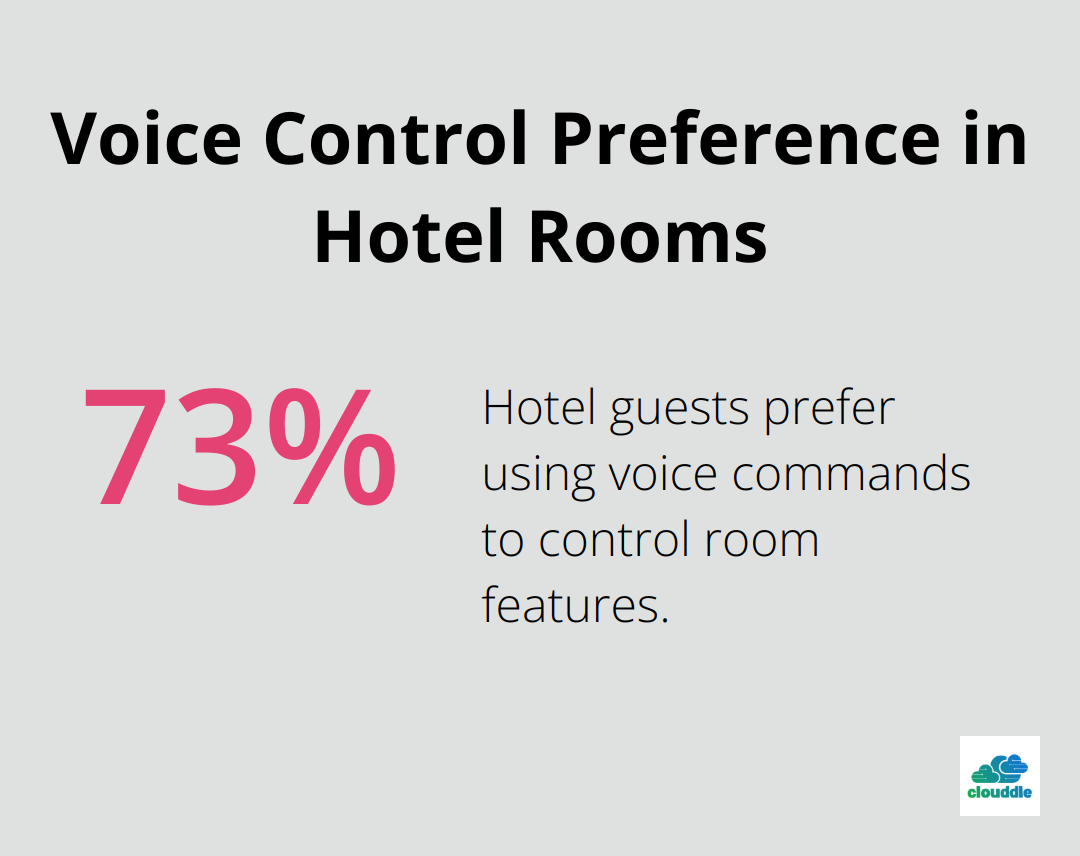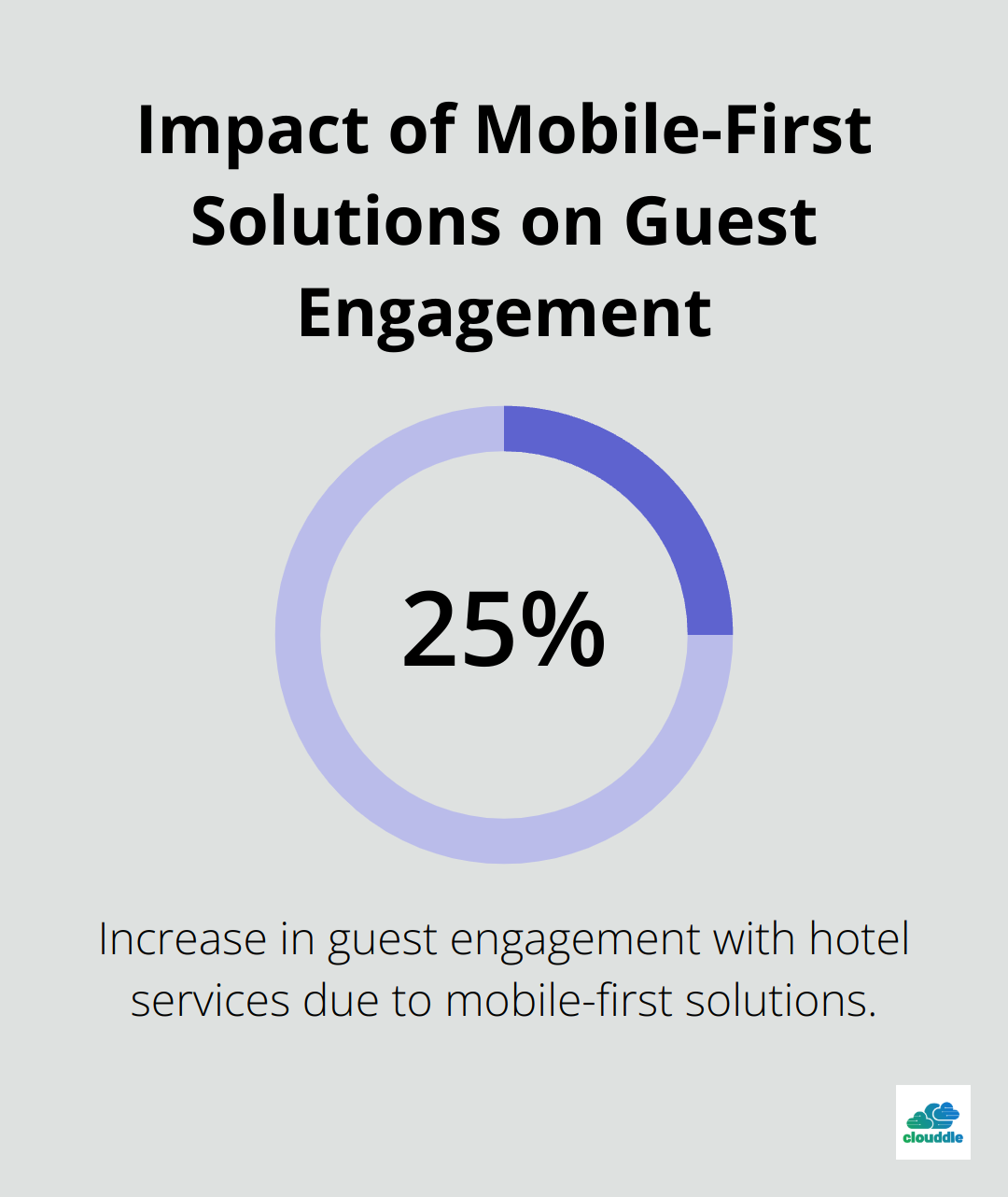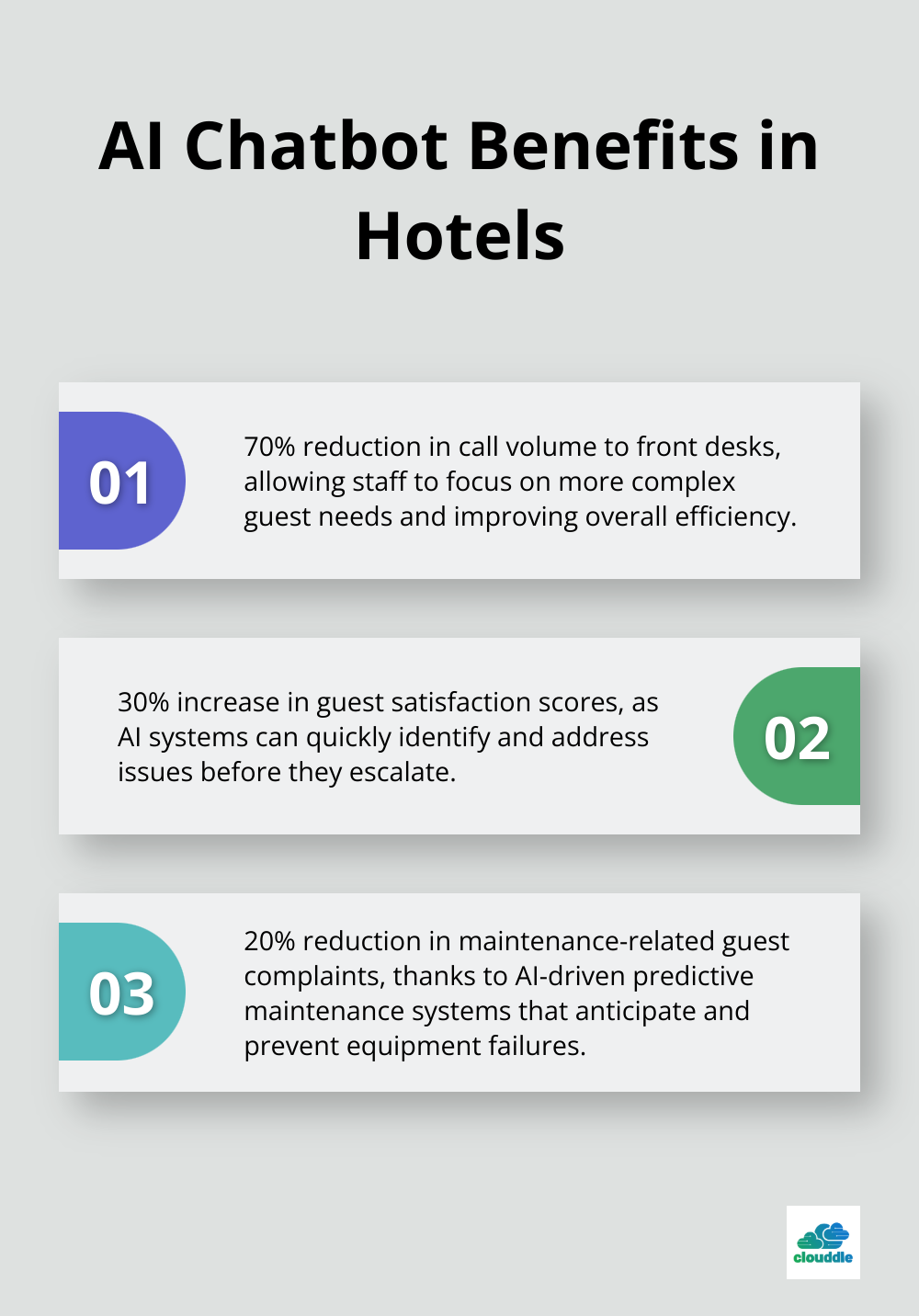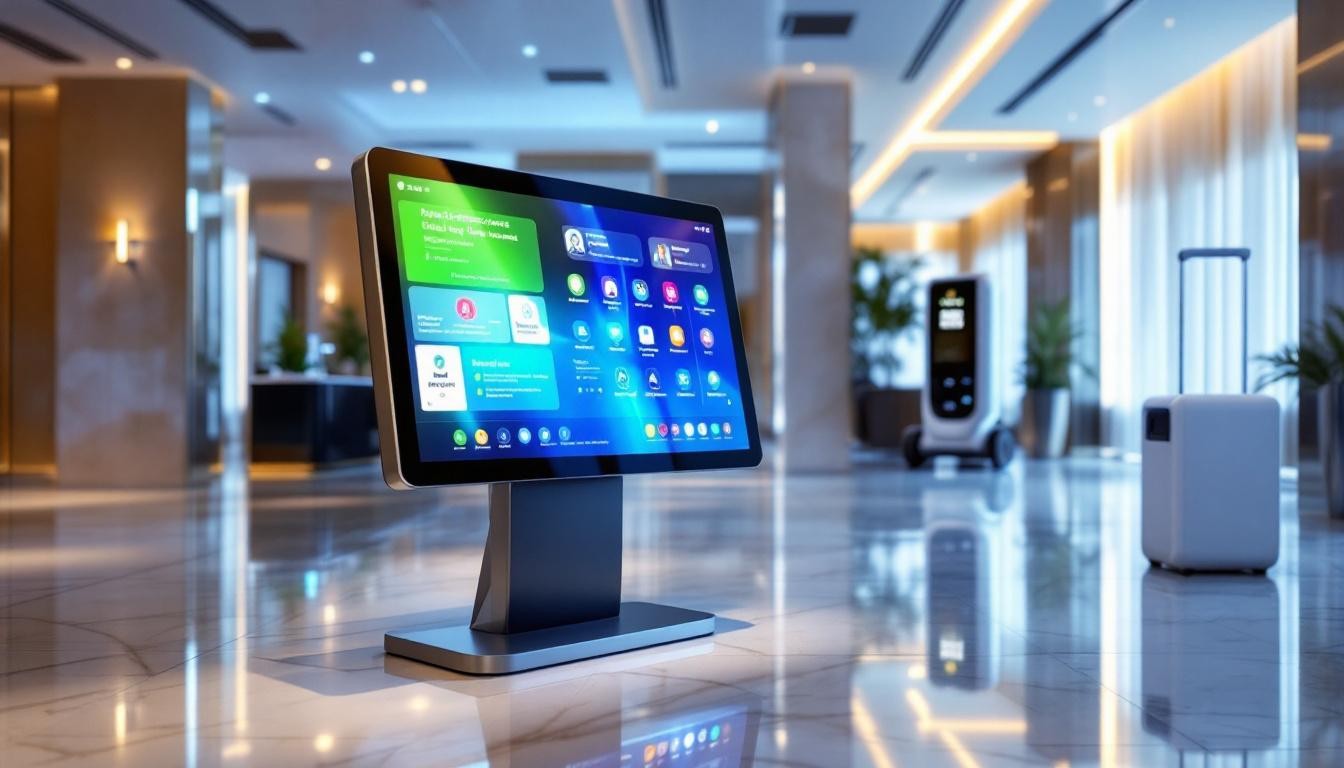The hospitality industry is undergoing a technological revolution. From smart rooms to AI-powered services, innovative technology in the hospitality industry is reshaping guest experiences and operational efficiency.
At Clouddle, we’re excited to explore the cutting-edge advancements transforming hotels and resorts worldwide. In this post, we’ll dive into the game-changing tech that’s setting new standards for comfort, convenience, and sustainability in hospitality.
How Smart is Your Hotel Room?
The Power of Voice
Smart room technology revolutionizes the hospitality industry, offering guests unprecedented control and personalization. Voice-activated systems allow guests to adjust lighting, temperature, and entertainment systems, all powered by advanced IoT devices.
A recent study by Hospitality Technology reveals that 73% of hotel guests prefer to use voice commands to control room features. This trend has led to a surge in the adoption of virtual assistants like Amazon’s Alexa for Hospitality and Google’s Nest Hub. These AI-powered devices handle tasks ranging from setting alarms to ordering room service, which significantly enhances the guest experience.

IoT: The Invisible Butler
The Internet of Things (IoT) takes personalization to new heights. Smart sensors and connected devices work together to create a tailored environment for each guest. For example, Hilton’s Connected Room initiative uses IoT to create a smart, intuitive in-room environment, reducing friction and enhancing comfort, which leads to higher guest satisfaction.
Sustainability Meets Comfort
Energy management systems benefit both hotels and guests. These systems use occupancy sensors and smart thermostats to optimize energy use without compromising comfort. The Marriott International chain implemented such systems across their properties and saw a 15% reduction in energy consumption. This not only lowered operational costs but also appealed to environmentally conscious travelers (who make up an increasing portion of the market).
The Future of Smart Rooms
As smart room technology evolves, we expect to see even more innovative features. Biometric access control, augmented reality experiences, and AI-powered personal assistants are just a few examples of what’s on the horizon. These advancements will further personalize the guest experience and streamline hotel operations.
Smart room technology creates an intuitive, efficient, and sustainable hotel experience. It’s not just about gadgets; it’s about transforming every aspect of a guest‘s stay. As we move towards more connected and personalized experiences, the line between technology and hospitality continues to blur. The next frontier? Contactless solutions and mobile integration, which we’ll explore in the following section.
Seamless Tech for Modern Guests
The hospitality industry embraces contactless solutions and mobile integration to meet the expectations of tech-savvy travelers. This shift represents a fundamental change in hotel operations and guest interactions.
Mobile Check-In Revolution
Mobile check-in transforms the hotel experience. Technology plays a crucial role in the success of a modern hotel, enhancing operational efficiency, improving guest satisfaction, and facilitating a more seamless experience.
Marriott International reported a 20% increase in customer satisfaction scores after implementing mobile check-in across their properties. This technology streamlines the arrival process and allows hotels to reassign staff to more value-added guest services.
Digital Keys Unlock Convenience
Digital room keys (the natural progression from mobile check-in) eliminate the need for physical key cards. This innovation reduces plastic waste and solves the problem of lost or demagnetized cards.
According to the Trends Global Survey, 80% of travelers feel it’s important to be able to book their trip entirely online. Hilton’s Digital Key on the Hilton app is an example of how hotels are adapting to these preferences.
Frictionless Payment Systems
Contactless payment systems become essential in the post-pandemic world. Hotels that implement these systems report faster check-out times and increased guest spending on amenities.
The Wynn Las Vegas saw a 10% increase in in-house spending after introducing a comprehensive contactless payment system. This increase stems from the ease and convenience of making purchases without cash or physical cards.
In-App Services: The New Concierge
Mobile apps revolutionize how guests interact with hotel services. These apps provide a seamless, 24/7 concierge experience for everything from ordering room service to booking spa appointments.
The Ritz-Carlton app allows guests to chat directly with hotel staff, make service requests, and control room features. This level of integration leads to a 15% increase in ancillary revenue for properties using such comprehensive apps.
Hotels that implement these mobile-first solutions see an average 25% increase in guest engagement with hotel services. This increased engagement translates directly to higher revenue and improved guest satisfaction scores.

The shift towards contactless and mobile-integrated solutions becomes a competitive necessity in the hospitality industry. As advancements continue in this area, AI-powered guest services emerge as the next frontier in hospitality technology.
AI Transforms Guest Experiences
24/7 AI-Powered Support
AI chatbots have become indispensable for hotels, providing round-the-clock customer support. These virtual assistants handle a wide range of guest inquiries, from room service orders to local recommendations. The Cosmopolitan of Las Vegas introduced an AI concierge named Rose, which acts as a personal concierge for guests.
Hotels that use AI chatbots report a 70% reduction in call volume to their front desks, allowing staff to focus on more complex guest needs. This shift improves efficiency and enhances guest satisfaction by providing instant responses at any time of day.

Personalization Through Predictive Analytics
AI’s ability to analyze vast amounts of data transforms how hotels personalize guest experiences. By examining past stay information, social media activity, and booking patterns, AI systems predict guest preferences with remarkable accuracy.
The Dorchester Collection hotel group implemented an AI system that analyzes guest feedback in real-time. This led to a 30% increase in guest satisfaction scores by quickly identifying and addressing issues before they escalated.
Predictive analytics also enable hotels to tailor their marketing efforts. The Venetian Resort in Las Vegas uses AI to segment its email campaigns, resulting in a 12% increase in email open rates and a 15% boost in click-through rates.
Streamlined Operations and Maintenance
AI revolutionizes back-of-house operations. Automated inventory management systems use AI to predict supply needs, reducing waste and ensuring that guest requests are always fulfilled.
Hilton’s AI-powered system, “Connie,” assists in managing inventory and predicting maintenance needs. This proactive approach has led to a 20% reduction in maintenance-related guest complaints across their properties.
AI-driven predictive maintenance is another game-changer. The Wynn Las Vegas implemented an AI system that predicts equipment failures before they occur, reducing unexpected downtime by 35% and saving millions in potential repair costs.
Future AI Applications in Hospitality
The hospitality sector will see even more innovative AI applications. AI-powered room customization and predictive staffing models are just the beginning. Hotels that embrace these technologies will enhance guest experiences and gain a significant competitive edge in an increasingly tech-driven industry.
Final Thoughts
The hospitality industry embraces a technological revolution that reshapes guest experiences and operational efficiency. Smart rooms, AI-powered chatbots, and IoT devices create personalized environments, while contactless solutions and mobile integration streamline processes. These innovative technologies in the hospitality industry improve operational efficiency, reduce costs, and elevate guest satisfaction to unprecedented levels.
We expect to see more groundbreaking innovations in the future, including biometric access control and augmented reality experiences. These advancements will continue to blur the lines between physical and digital experiences in hospitality. Hotels that adopt these technologies will gain a significant competitive edge in an increasingly tech-driven market.
At Clouddle, we help hospitality businesses navigate this digital landscape with our Network as a Service (NaaS) solutions. Our cutting-edge networking, entertainment, and security features enable hotels to deliver exceptional guest experiences without large upfront investments. The future of hospitality is digital, and those who embrace these innovations will thrive in the competitive market.


